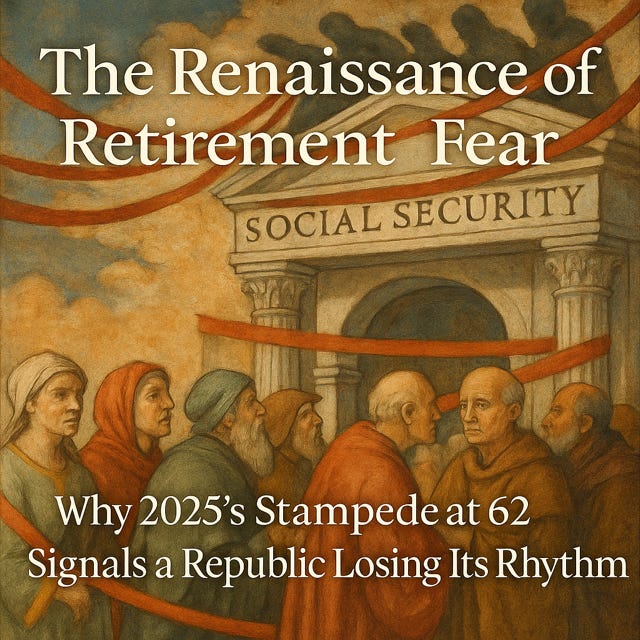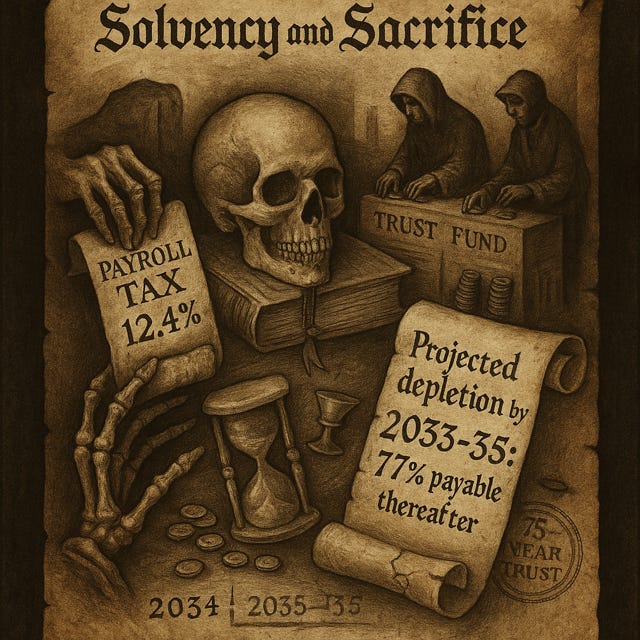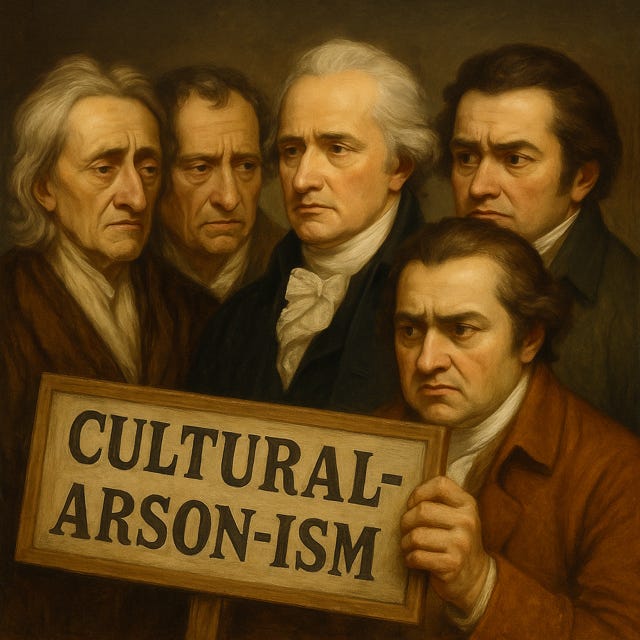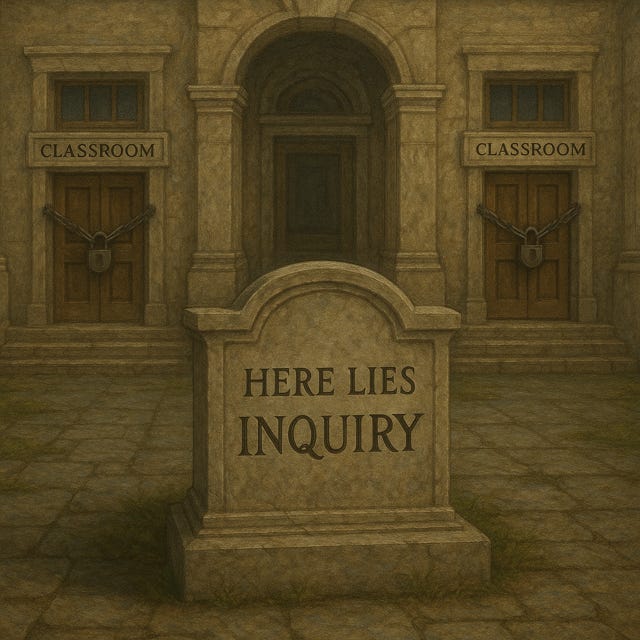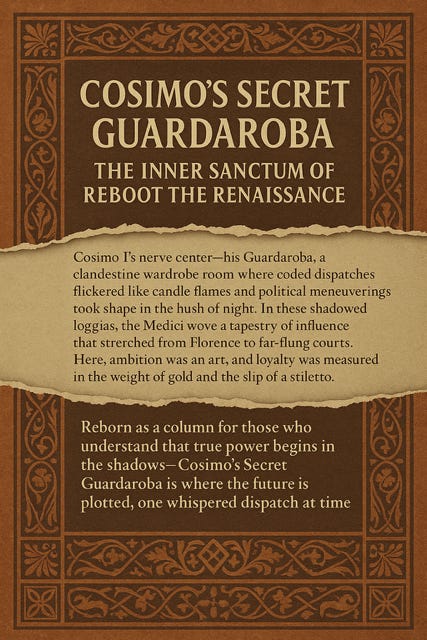The Renaissance of Retirement Fear & The Reign of The Reactionaries: The Know-Nothing Century
Reboot The Renaissance: Cosimo’s Secret Guardaroba is where the future is plotted, one whispered dispatch at a time.
The Renaissance of Retirement Fear: How Political Uncertainty Undermines Long-Term Thinking
According to, well, every media outlet ever, but this from the New York Times: the news that Social Security’s insolvency has been moved forward and now will see steep and automatic 23% cuts across the board by 2033 has been met with a continuation of virtually the same “policy” as this regime had six months ago: fear.
The Financial Times last month put it best with its headline: “Donald Trump’s ‘Marie Antoinette moment’: call for national sacrifice falls flat.”
So. This fear of the unknown. Fear what he will do next. Fear if there will even be a government by 2033. Nothing is certain. And that’s the policy: the more we fear the more we blame. The more we blame the more divided we are. The more divided we are the less we see or care about the rampant corruption and cruelty inflicted by those in power. So, here we go, with yet another call to reboot the republic.
The Stampede at Sixty-Two
They were supposed to be the most confident class of retirees in American history.
Double-income boomers. Home equity heroes. Survivors of dot-com crashes, Wall Street meltdowns, and COVID shutdowns. The 62-year-olds of 2025 weren’t stumbling blindly into old age—they had spreadsheets, savings, advisors, and actuarial charts.
And yet—they fled.
Between January and May 2025, the Social Security Administration reported an 18% surge in retirement claims compared to the same stretch in 2024. Not during a market collapse. Not in response to a pandemic. Not even during a categorized recession. These early filings were powered by something even more potent than pain: anticipation.
“It’s a very consequential decision,” said Kathleen Romig, senior analyst at the Center on Budget and Policy Priorities. “It can mean hundreds of dollars every month and many thousands of dollars over your lifetime.” NPR, June 12, 2025
Yet, in Berthoud, Colorado, Bill Armstrong—62, out of tech work, recovering from cancer—made his move early. “I better get in the system before they move that age higher,” he also told NPR. “We all paid into those things. In my case, 42 years now.”
His decision wasn’t driven by hardship alone, it was driven by doubt. Doubt about whether the system would still be his by the time he reached 67. Doubt reinforced by facts, but those have been around for decades. The doubt now is influenced by something stronger: political signals.
Armstrong is not alone. Across the country, people who planned to wait until 70—when benefits peak—filed early. Not out of ignorance, but out of dread.
They knew the cost.
They filed anyway.
Because the tune changed. And quickly.
Regimes of Rumor
The Reign Of The Reactionaries: The Know-Nothing Century - How The Great Unlearning Aims to End ‘Society’
Prologue: Bonfire Of The Brightest
For centuries, the Western intellectual tradition has revolved around one revelation: society is not simply a place we inhabit—it is a contract we enact. It was John Locke (1632–1704) who first lit the flame by insisting that individuals, in pursuit of life, liberty, and property, must bind themselves to a shared set of laws, protections, and responsibilities. Montesquieu (1689-1755) constructed the scaffolding of the separate powers. Then, in the United States, it was Hamilton, Madison, and Jay in The Federalist Papers who argued for its codification in the form of the U.S. Constitution adopted on June 21, 1788, when New Hampshire became the ninth state to approve it. From Florence to Philadelphia, the Enlightenment redefined freedom not as escape, but as participation.
This concept—that we rise together or fall in fragments—is no longer debated. It is being deleted. Not trimmed, but torched. Not reshaped, but reversed. Institutions are now “indoctrination centers.” Expertise is “elitism.” Solidarity is “submission.”
The far-right reactionaries used to believe in reversing time. Bringing back the old. U-turning the course of history. It was an argument. It had some underpinnings. However, now, a new breed of reactionary has evolved, or shall we more appropriately say: devolved: does not wish to govern society at all. It wishes to unmake it.
I’m calling it Cultural-Arson-ism instead of Conservatism.
What once passed as a fight over the size of government has mutated into an open rejection of its legitimacy. Meanwhile, the new GOP is a party not of policy, but of performance—where sabotage is virtue, and knowledge is heresy.
And this isn’t only theory. It’s praxis. In America, agency heads are appointed for their willingness to dismantle the very systems they command. In the UK, climate offices are shuttered. In Brazil, indigenous research is defunded. Across the West, statecraft has become stagecraft.
Once, the Right sought to rewind history or at least yell: “stop!” to paraphrase William F. Buckley, Jr. Now, it seeks to cancel it.
To reinforce, all this new reactionism comes from the alleged heirs of conservatism. Yet, nothing is conservative about it. Edmund Burke (1729–1797), the intellectual founder of conservative, said:
“Society is indeed a contract. It is a partnership in all science; a partnership in all art; a partnership in every virtue, and in all perfection. As the ends of such a partnership cannot be obtained in many generations, it becomes a partnership not only between those who are living, but between those who are living, those who are dead, and those who are to be born.”
This bears no resembles to the new movement that has engulfed the right.
Once, it was books. Bundled by the armful, flung into the flames, licked by the tongues of zealotry. Mirrors, musical instruments, paintings—objects of beauty and knowledge deemed too dangerous for the soul. Savonarola’s Bonfire of the Vanities in Florence was a warning from history: when the forces of regression gain power, the brilliant pay the price.
But in 2025, the bonfire has metastasized. It bans books still, for certain. But now, it burns budgets, journal articles, neural networks, independence institutions, and the public welfare. Today’s torches are digital, their flames algorithmic, their fuel the fury of manufactured grievance and casual cruelty.
The forces on the extreme right claim America is collapsing. America is being collapsed—strategically, theatrically, vindictively. The MAGA movement is not merely anti-liberal, it is anti-logic. Its target is not only the left, but the luminous. It seeks to unmake not merely the state, but the Enlightenment.
Calling it a culture war would be to belie its actual more sinister purpose: it is a knowledge war.
The Renaissance began when courageous minds defied the darkness. When The Medici backed astronomers, not astrologers. When Florence funded anatomists, not arsonists. When power meant patronage, not performative pettiness.
Today, that legacy is being undone by a movement that mistakes its own ignorance for integrity. A movement that punishes the pursuit of truth. That defunds the discoverers. That jails the referees of reality.
And the world suffers. The original quote was: “when France sneezes the whole of Europe catches a cold”. It was said by an Austrian Chancellor, Prince Klemens von Metternich, one of the architects of balance of power. It was adapted for the United States as a use case in later centuries. Now, the U.S. is in full metabolic meltdown and the world may go with it.
For when the greatest generator of global talent, funding, and coordination decides that truth is negotiable and reason is elitist: plagues fester, planets warm, and possibilities shrink.
This is the bonfire of the brightest.
And if we do not reboot the republic—not as a solitary state, but as a global system—we will lose artists, engineers, and alchemists of modernity to be sure. But we will also, more importantly, lose the very idea that civilization can be improved.






